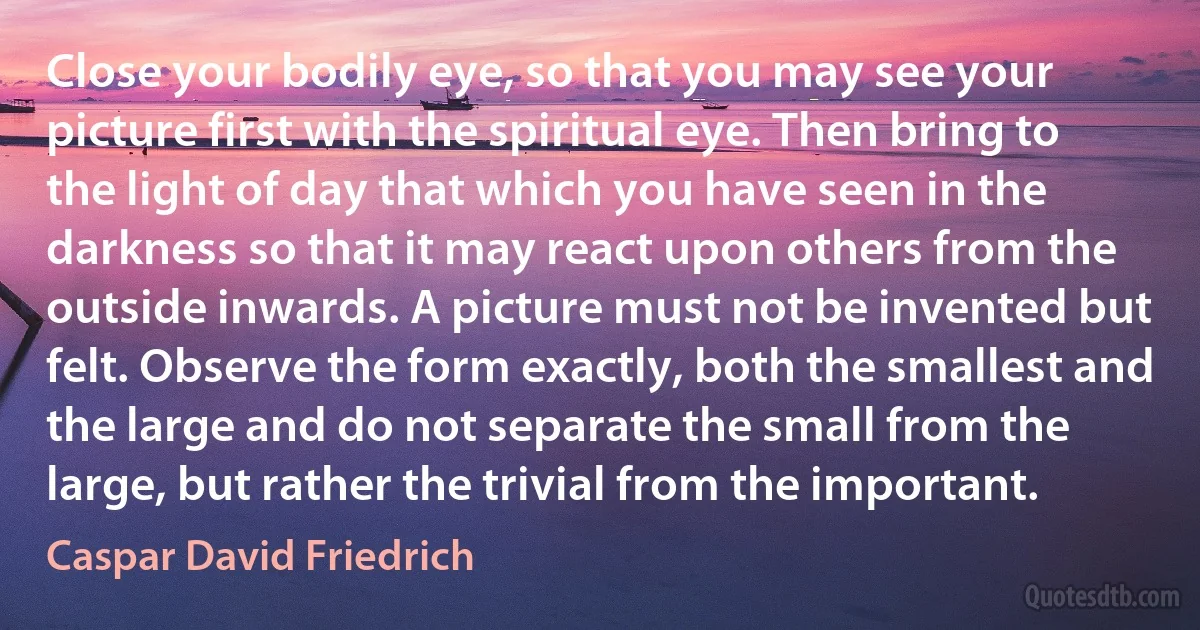React Quotes - page 15
This is not, I say, a sectarian question, it is a national question; it is not a question of aggrandizing or denuding any individual sect, it is a question of raising the efficiency of the Universities as national instruments of education; and I firmly believe that the infusion of new blood, which will result from the adoption of this policy, will speedily bring their teaching organization into greater harmony with the times... We wish to see the Universities thrown altogether open to the nation; and thus, while the nation derives the full benefit of the high traditional position of those great institutions, my hope is, that the freer and fuller life of the nation will in turn react on the Universities, and render them better qualified to fill their high position.

Henry Campbell-Bannerman
They say that [I am icy, hard] because I'm sincere. Even too sincere. And because I don't waste time in flowery small talk, as people do in India, where the first half hour is spent in compliments: »How are you, how are your children, how are your grandchildren, and so forth.« I refuse to indulge in small talk. And compliments, if at all, I save for after the job is done. But in India people can't stomach this attitude of mine, and when I say, »Hurry up, let's get to the point,« they feel hurt. And think I'm cold, indeed icy, hard. Then there's another reason, one that goes with my frankness: I don't put on an act. I don't know how to put on an act; I always show myself for what I am, in whatever mood I'm in. If I'm happy, I look happy; if I'm angry, I show it. Without worrying about how others may react. When one has had a life as difficult as mine, one doesn't worry about how others will react. And now go ahead. You can ask anything you like.

Indira Gandhi
An essential part of any successful action on the part of the United States is an understanding on the part of the people of America of the character of the problem and the remedies to be applied. Political passion and prejudice should have no part. With foresight, and a willingness on the part of our people to face up to the vast responsibility which history has clearly placed upon our country, the difficulties I have outlined can and will be overcome. ... to my mind, it is of vast importance that our people reach some general understanding of what the complications really are, rather than react from a passion or a prejudice or an emotion of the moment. As I said more formally a moment ago, we are remote from the scene of these troubles. It is virtually impossible at this distance merely by reading, or listening, or even seeing photographs or motion pictures, to grasp at all the real significance of the situation. And yet the whole world of the future hangs on a proper judgment.

George C. Marshall
Much of the literature disseminated within the "movement" over the last few decades calls for courage and heroism. That is fine if combined with wisdom and cunning. Unfortunately, our "leaders" have been prone to sending young, idealistic men off to be cannon fodder. A wise man does not paint a target (swastika) on his chest and dare the government to react.

David Lane (white nationalist)
Mullah-Saheb gave everybody who visited him enough time to empty their hearts. He listened, he was very patient, he did not react in anger. Any visitor could tell that he was thinking very deeply about what he was saying.... Second, if Amir ul-Mu'mineen promised something, he did it. Third, Karzai likes to show off and pretend that he knows a lot, while you never felt that with Amir ul-Mu'mineen.

Mohammed Omar
I will point out a curious, inveterate, and widespread illusion - the illusion that our earthly bodies are a kind of norm of humanity, so that ethereal bodies, if such there be, must correspond to them in shape and size.
When we take a physical view of a human being in his highest form of development, he is seen to consist essentially of a thinking brain, the brain itself, among its manifold functions, being a transformer whereby intelligent will power is enabled to react on matter. To communicate with the external world, the brain requires organs by which it can be transported from place to place, and other organs by means of which energy is supplied to replace that expended in the exercise of its own special functions.

William Crookes
Ifness pursed his lips judiciously. "All folk, mercantilists as well as tavern-keepers and musicians, try to relate their work to abstract universals. We mercantilists are highly sensitive to theft, which stabs at our very essence. To steal is to acquire goods by a simple, informal, and inexpensive process. To buy identical goods is tedious, irksome, and costly. Is it any wonder that larceny is popular? Nonetheless it voids the mercantilist's reasons for being alive; we regard thieves with the same abhorrence that musicians might feel for a fanatic gang which beat bells and gongs whenever musicians played.”
Frolitz stifled an ejaculation.
Ifness tasted the mug of green cider which Loy had set before him. "To repeat: when a thief steals property he steals life. For a mercantilist I am tolerant of human weakness, and I would not react vigorously to the theft of a day. I would resent the theft of a week; I would kill the thief who stole a year of my life.”.

Jack Vance
We can only take it so far, because man can only take it so far, lower self can only take it so far, and you have to realize that the public is only at a certain place. We won't see the day when the public accepts what we wanna project, even though they are accepting a lot now. By the time they're accepting it, maybe they'll be too old. ... If it's total freedom, I guess the ultimate thing you can go into is total silence between the audience and performer, with the performer projecting something he doesn't even have to play. A total silence trip is the ultimate. ... We do antagonize them psychologically. People look at us and react. They either go "Wow! Hey-hey-hey, baby!" and we say that's great. They're reacting and that's wonderful. It's better than them sitting there doing nothing. I say make them react - do whatever's in your power to move the audience, and if that's where it is, and there where it is with America, sex and violence, then I say project it.

Alice Cooper
My work with Benton was important as something against which to react very strongly, later on; in this, it was better to have worked with him than with a less resistant personality who would have provided a much less strong opposition. At the same time Benton introduced me to Renaissance art. [remark on his former art-teacher w:Thomas Hart Benton ].

Jackson Pollock
...education should try to lessen the obstacles, diminish the friction, invigorate the energy, and should train minds to react, not at haphazard, but by choice, on the lines of force that attract their world. What one knows is, in youth, of little moment; they know enough who know how to learn. Throughout human history the waste of mind has been appalling, and, as this story is meant to show, society has conspired to promote it. No doubt the teacher is the worst criminal, but the world stands behind him and drags the student from his course. The moral is stentorian. Only the most energetic, the most highly fitted, and the most favored have overcome the friction or the viscosity of inertia, and these were compelled to waste three-fourths of their energy in doing it.

Henry Adams
Temperament refers to the mode of reaction and is constitutional and not changeable; character is essentially formed by a person's experiences, especially of those in early life, and changeable, to some extent, by insights and new kinds of experiences. If a person has a choleric temperament, for instance, his mode of reaction is "quick and strong.” But what he is quick or strong about depends on his kind of relatedness, his character. If he is a productive, just, loving person he will react quickly and strongly when he loves, when he is enraged by injustice, and when he is impressed by a new idea. If he is a destructive or sadistic character, he will be quick and strong in his destructiveness or in his cruelty. The confusion between temperament and character has had serious consequences for ethical theory. Preferences with regard to differences in temperament are mere matters of subjective taste. But differences in character are ethically of the most fundamental importance.

Erich Fromm


